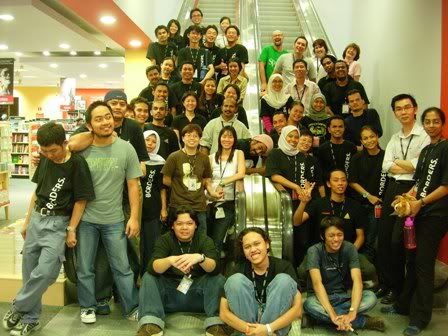Jangan lupa ke HELP!Kelab Seni Filem MalaysiaPresentsMALAYSIAN SHORTS: edisi Nov 2005
Curated by Amir Muhammad
Special Thanks: Red Communications & Bernard Chauly.
Monday, 14 November, 8pm.
HELP University College Auditorium, Pusat Bandar Damansara KL.
Admission is FREE!
Vote for your favourite shorts of the night!
The third and final Malaysian Shorts installment of 2005 sees yet another multilingual package by students and new directors. The naughty and nice will mingle to create a smorgasbord to savour. Q&A with the directors will follow after the screening. Jangan lepaskan peluang ini!
10 shorts (out of 22 entries).
Total running time: 1 hour 45 minutes.
1. AL-BAQARAH by Saiful Razman (7 min, Malaysia, in Malay).
Enigmatic urban odyssey where people literally never say what they seem to. Named after a part of the Quran.
* Teluk Intan-born Saiful Razman, 25, is a visual artist who recently completed a year-long stint at the Rimbun Dahan Arts Residency.
2. JOB INTERVIEW by Khoo Eng Yow (5 min, Malaysia-Singapore, in Chinese)
A Malaysian goes down to Singapore for a job interview. But first the question of water needs to be resolved…Commissioned and screened as part of the Singapore-Malaysia Short Film Exchange at The Substation last year.
* Khoo Eng Yow was once a Petronas scholar. Now he is a professional editor, director of the documentary ‘Ah Kew the Digger’ as well as the forthcoming fictional ‘The Old House’.
3. SIKKAL by Kannan Thiagarajan (21 min, Malaysia, in Tamil)
A tutor, beset by post-collegiate ennui, experiences temptation. As Dustin Hoffman once wondered aloud in The Graduate: “Are you trying to seduce me?”
* Kannan Thiagarajan teaches at MultiMedia University. His first short “Chitappa’ charmed many at a previous edition of Malaysian Shorts. “Sikkal” is his second short.
4. WICKED by Aaron Chung (3 min, Malaysia, no dialogue).
Does TV cause violence? The answer might be eye-popping. Shot on film and not for the squeamish.
* Kuching-born Aaron Chung is a graduate of Akademi Filem Malaysia. He does his own stunts.
5. GOING HOME by Chong Yew Fei (14 min, Malaysia, in Chinese)
Sometimes, they come back.
* Chong Yew Fei’s script for this short received a Special Mention in the Shortcuts Short Film
Competition this year.
6. JIDAH by Sheikh Munasar (4 min, Malaysia, in Malay)
Odd little thing ostensibly about a man who misses his mother, even though she seems not too perturbed.
* Sheikh Munasar, 22, is a producer at Leo Burnett Advertising. His earlier work “Keluarga Saya’ got a lot of attention at a previous edition of Malaysian Shorts.
7. LIFE THROUGH LINES by Joseph Liu (19 min, Malaysia, in Chinese)
Striking ensemble piece in which an ancient art-form achieves contemporary relevance in the concrete jungle,
* Joseph Liu’s previous short was the rather different ‘Mini Stardust’ which starred his little nieces and a host of special effects.
8. HUNGRY? By Hardesh Singh (3 min, Malaysia, in English)
Consumerism in the face of all the world’s problems. It’s a dog’s life.
* Hardesh Singh is one of Malaysia’s busiest composers, having scored Chemman Chaalai, The Big Durian, Tokyo Magic Hour and Monday Morning Glory as well as the upcoming Gubra and Lelaki Komunis Terakhir, all in the space of 2 years. “Hungry?” is his directorial debut.
9. CAPTIVATION by Tan Meng Yoe (7 min, Malaysia, in Chinese)
Can you fall in love with someone whose face you glimpsed for only a second?
* Tan Meng Yoe is a student at Monash University in Sunway.
10. HARI MENUNGGU by Arif Rafhan Othman (21 min, Malaysia, in Malay).
Romantic opportunity, chance encounters, violence and even an insurance salesman all play their part in the circular events of a lazy Sunday.
* Arif Rafhan Othman is better known as Apan, His first short “Ptuihhh!” was an audience favourite when we screened it last year. This is his second short. More info on him can be found at www.outphace.com
TAMAT.



